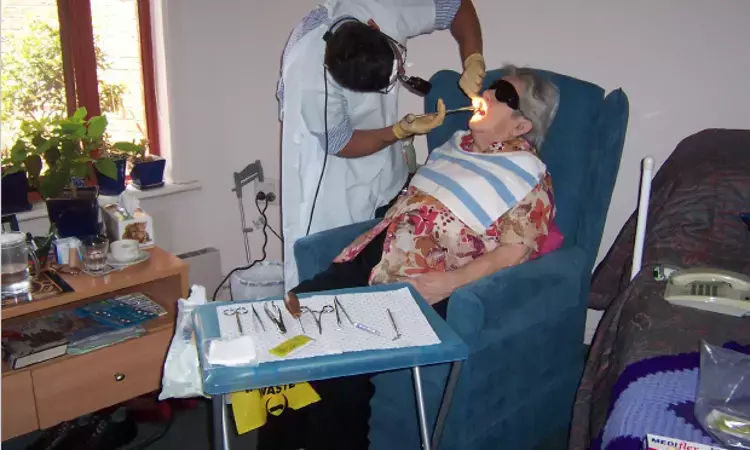- Home
- Medical news & Guidelines
- Anesthesiology
- Cardiology and CTVS
- Critical Care
- Dentistry
- Dermatology
- Diabetes and Endocrinology
- ENT
- Gastroenterology
- Medicine
- Nephrology
- Neurology
- Obstretics-Gynaecology
- Oncology
- Ophthalmology
- Orthopaedics
- Pediatrics-Neonatology
- Psychiatry
- Pulmonology
- Radiology
- Surgery
- Urology
- Laboratory Medicine
- Diet
- Nursing
- Paramedical
- Physiotherapy
- Health news
- Fact Check
- Bone Health Fact Check
- Brain Health Fact Check
- Cancer Related Fact Check
- Child Care Fact Check
- Dental and oral health fact check
- Diabetes and metabolic health fact check
- Diet and Nutrition Fact Check
- Eye and ENT Care Fact Check
- Fitness fact check
- Gut health fact check
- Heart health fact check
- Kidney health fact check
- Medical education fact check
- Men's health fact check
- Respiratory fact check
- Skin and hair care fact check
- Vaccine and Immunization fact check
- Women's health fact check
- AYUSH
- State News
- Andaman and Nicobar Islands
- Andhra Pradesh
- Arunachal Pradesh
- Assam
- Bihar
- Chandigarh
- Chattisgarh
- Dadra and Nagar Haveli
- Daman and Diu
- Delhi
- Goa
- Gujarat
- Haryana
- Himachal Pradesh
- Jammu & Kashmir
- Jharkhand
- Karnataka
- Kerala
- Ladakh
- Lakshadweep
- Madhya Pradesh
- Maharashtra
- Manipur
- Meghalaya
- Mizoram
- Nagaland
- Odisha
- Puducherry
- Punjab
- Rajasthan
- Sikkim
- Tamil Nadu
- Telangana
- Tripura
- Uttar Pradesh
- Uttrakhand
- West Bengal
- Medical Education
- Industry
Oral health management may delay progression of cognitive disorders among elderly

Oral health management can help delay progression of cognitive disorders among elderly suggests a new study published in the Journal of Oral Rehabilitation.
Oral health may be associated with cognitive disorders such as mild cognitive impairment or dementia.
This study elucidates the effects of oral health conditions on the progression of cognitive disorders.
In this longitudinal study designed to investigate the relationship between changes in cognitive function and changes in oral health conditions, the number of residual natural teeth in the mandible was higher in the normal cognitive function (normal) group than in the converter and mild cognitive impairment (MCI)/dementia groups. The ratio of maxillary removable partial denture use was higher in the converter and MCI/dementia groups than in the normal group. The MCI/dementia group had a higher rate of mandibular complete denture use than the normal group.
Data were collected from 153 participants of the Korean Longitudinal Study on Cognitive Aging and Dementia cohort who completed the longitudinal dental examinations and cognitive function assessments using the three-wave biannual survey. We analysed the relationship between dental factors and the conversion of cognitive function.
Results
The ratio of maxillary removable partial denture use (p = .03) was high in the converter and mild cognitive impairment/dementia groups. The low-grade ratio of posterior masticatory performance increased in the converter and mild cognitive impairment/dementia groups (modified Eichner index 2, p = .04). The mild cognitive impairment/dementia group had a higher rate of complete mandibular denture use (p < .001). The converter and mild cognitive impairment/dementia groups had fewer remaining teeth (p < .05) or removable prostheses (p < .01) than the normal group.
Masticatory performance is associated with the conversion of cognitive disorders. Our findings suggest that oral health management can help delay the progression of cognitive disorders.
Reference:
Kim, K-S, Ahn, S, Han, JW, et al. Oral health and risk of cognitive disorders in older adults: A biannual longitudinal follow-up cohort. J Oral Rehabil. 2023; 00: 1- 10. doi:10.1111/joor.13486
Keywords:
Kim, K-S, Ahn, S, Han, JW, J Oral Rehabilitation, Oral health, risk, cognitive, disorders, older adult
Dr. Shravani Dali has completed her BDS from Pravara institute of medical sciences, loni. Following which she extensively worked in the healthcare sector for 2+ years. She has been actively involved in writing blogs in field of health and wellness. Currently she is pursuing her Masters of public health-health administration from Tata institute of social sciences. She can be contacted at editorial@medicaldialogues.in.
Dr Kamal Kant Kohli-MBBS, DTCD- a chest specialist with more than 30 years of practice and a flair for writing clinical articles, Dr Kamal Kant Kohli joined Medical Dialogues as a Chief Editor of Medical News. Besides writing articles, as an editor, he proofreads and verifies all the medical content published on Medical Dialogues including those coming from journals, studies,medical conferences,guidelines etc. Email: drkohli@medicaldialogues.in. Contact no. 011-43720751


